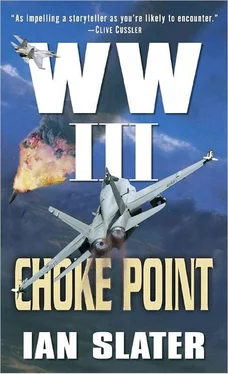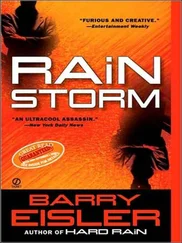Striking the carrier’s deck, it sent a huge, rolling fireball that engulfed the center island, incinerating three men on Vulture’s Row, colored jackets running for their lives. The flight deck was penetrated by a jagged fourteen-foot-diameter crater, the high explosive bomb that had been built into the Falcon’s radar-gutted nose ripping open the rubberized deck with such force that would-be rescuers were burned and blown violently about the mangled deck or over the side. Many, their clothes afire, were scalded raw before they hit the water, the bleeding mass of wounds immediately attracting the sharks of the strait’s relatively warm waters.
Everyone was stunned by the sheer fury and unbelievable speed of what was the most successful kamikaze attack on an American carrier since World War II.
The two Super Hornets’ pilots, already low on gas, realized there was nowhere to land for either them or the two badly mauled squadrons of Tomcats and Hornets returning from Penghu.
Armstrong and Manowski had six minutes’ fuel remaining. And Admiral Crowley had a monumental problem on his hands. The five hundred feet of the designated launching area of the carrier, from the rearmost of the four arresting wires to the stopping area three hundred feet farther down the deck, at approximately midships, had been shortened to 260 feet because of the huge and still smoldering crater caused by the impact of the suicidal Falcon. Somehow, with Armstrong and Manowski making pattern in the four-by-one-mile oval-shaped fly zone off the carrier’s port side, and the twenty-two returning planes of McCain ’s FITCOMPRON only twenty minutes away to the northeast, Crowley, Cuso, and their staff in the carrier’s air traffic control center had to figure out how to bring their pilots and their billion-dollar birds home.
If the planes’ tail hooks could catch the first wire, rather than the third one, which exerted the least strain on a plane’s body, or the fourth wire farther down, they could buy themselves 150 vital extra feet. And with the hydraulic braking cylinder below deck jacked up as much as possible, without risking the tension in the arresting wire literally tearing the tail section off the plane, Crowley figured he might just conceivably get them all down. The net barrier could also be rigged to try to stop those aircraft that failed to be snagged by any of the arresting cables. The difficulty with the net, however, was that it was time consuming. The aircraft had to be disentangled from the elasticized net and a blue shirt had to direct the aviator out of the landing zone before the tractor hooked up and pulled the aircraft away to the designated parking areas along either side of the deck or below, into the hangar. And the whole enterprise depended on the hydraulic cylinders under the flight deck.
If the two cylinders had been damaged by the white heat from the crash’s fires, would they be able to provide the counterforce needed against the tremendous pull exerted by a landing aircraft’s tail hook? On inspection, immediately after the deck fire was doused, it was discovered that the explosion of the suicidal F-16, obviously one of the ROC jets captured on Kinmen by the ChiComs, had produced such intense temperatures that the hydraulic cylinders on the gallery deck for the fourth and the third wire, though aft of the crater, were bleeding, and that therefore the integrity of both cables and their spools was in question. Cuso’s conclusion, with which the flight director concurred, was that only the first and second wires could be trusted to trap the incoming planes successfully, bringing them to a stop from 150 mph in seconds. This did not eliminate the always clear and present danger of a plane’s tail hook failing to snag either of those wires. For this reason, the incoming pilots, as usual, would push their throttles to full power at the moment of touchdown, should they have to “bolter” down the fourteen-degree-angled deck, taking off to rejoin traffic for another attempt.
With the squadrons’ Tomcats and Hornets now only eleven minutes away, John Cuso quickly phoned the landing signals officer on the tiny forward portside platform. “LSO, it’s Cuso here. Give me your greenie board list.” Normally, this score list of the pilots’ carrier landing ability was kept in the relevant squadron’s Ready Room below the “roof,” but Cuso wanted a computer readout. Armstrong’s and Manowski’s Super Hornets, being so close to the boat, would be first in, but for the remainder of FITCOMPRON, now only ten minutes off, Admiral Crowley wanted the Hornets and Tomcats stacked in greenie board order. This meant that the best aviators in the squadrons would be given priority in the wait zone, since their previous “traps” record indicated that they would have the best chance of being able to hook the 1 wire on a first attempt. This would allow the colored shirts to clear the deck quickly for the next incoming plane.
And so the normal, nerve-wracking pressure with which McCain ’s aviators had to contend during carrier landings increased exponentially, each battle-fatigued pilot knowing there was not the slightest margin for error on the crater-shortened flight deck.
“FITCOMPRON ETA eight minutes.”
McCain ’s landing signals officer switched on the lenses, an arrangement of green, red, and orange lights to guide in the pilots, the first, in this case, being Chipper Armstrong. He’d made the break from the holding pattern, coming in downwind of the stamp-sized carrier deck ahead of him. His fuel level was critical, since his Super Hornet hadn’t been topped up from the usual standby airborne tanker, which was prevented from taking off from the carrier because the tanker’s props had been demolished by the Falcon’s suicide attack.
The landing signals officer watched Armstrong’s Hornet lowering its tail hook, landing gear, and flaps. “Call the ball!” he radioed Chipper.
In the Hornet’s back seat, Eagle was straining his neck, willing Chipper, as if by mental telepathy, to see the orange blob of the “meatball,” to make sure they were on the right line of approach.
“Call the ball,” came the LSO’s voice, his tone more demanding now. An ex-aviator himself, the LSO was both more and less forgiving of his charges, his eyes glued to the approaching speck in the leaden sky. “Snag it!” he told Armstrong.
It was critical, and every man and woman aboard the boat knew it, the LSO eschewing normal emissions control procedures, in which light signals only were used to avoid employing enemy-alerting radio.
“Call the ball!” the LSO barked.
“Doing my best,” Armstrong assured him.
“Best isn’t good enough! You’re a naval aviator. Snag it!”
“Roger ball!” said Chipper, confirming he had the amber light and row of green okay lights below it in his line of sight. It was a technique pioneered by a British official in Whitehall who had his secretary sight his desk as if it were a British carrier, telling her to keep a ball in sight. It required her to lower her torso comically, like someone forced to keep walking with some invisible weight on her head, pressing her down farther and farther as she came nearer to the desktop.
In the next nine seconds aviator Armstrong, Eagle Evans behind him in silent prayer, dropped the Super Hornet to thirty-five feet above the wounded carrier’s fantail, the fighter-bomber, its nose up, approaching at 143 knots, or approximately 158 mph.
“Bit too fast,” said someone in Air Traffic Control, “considering the crosswinds.”
Armstrong raised the nose a fraction higher, his tail hook lowering. Hitting the deck at 160 mph, he immediately gunned the twin turbofan-enhanced performance engines to full power, the scream of the turbofans and the thud of the landing or “controlled crash” deafening several off-duty sailors up on Vulture’s Row.
Читать дальше












